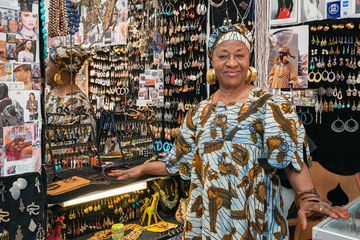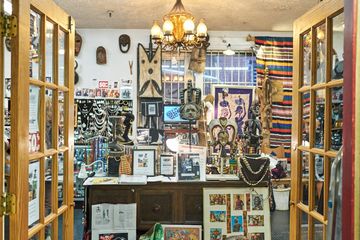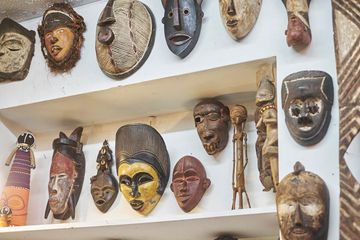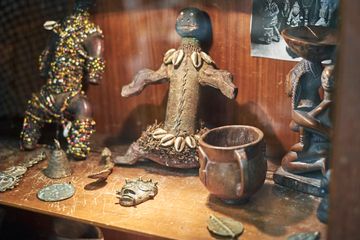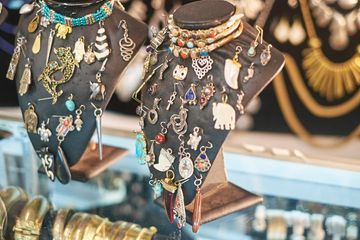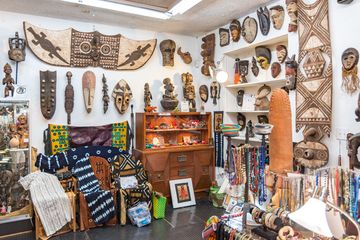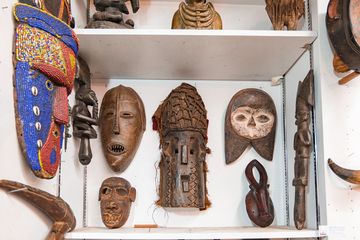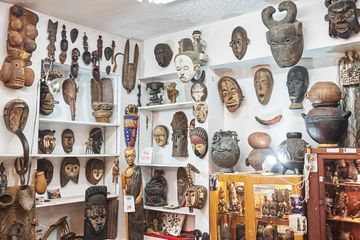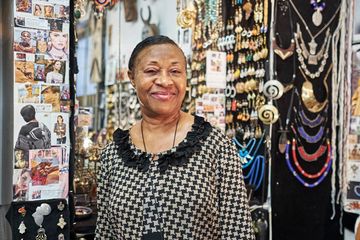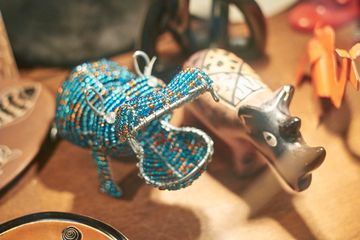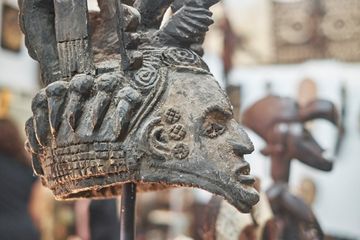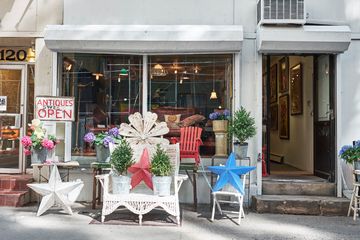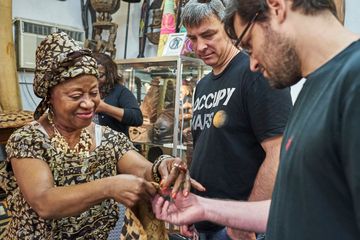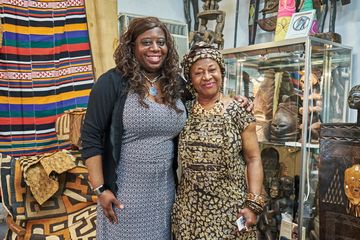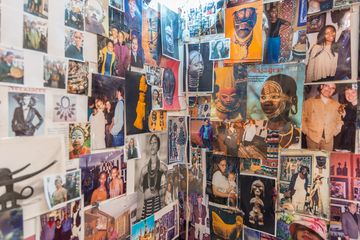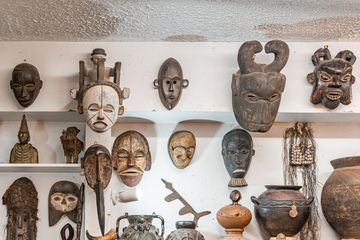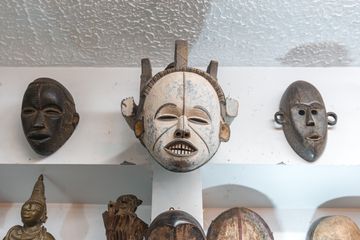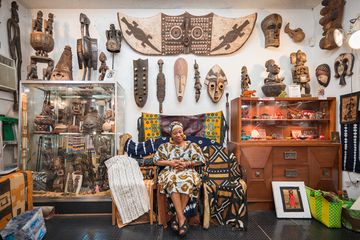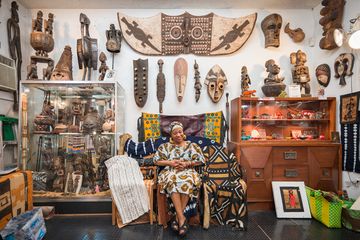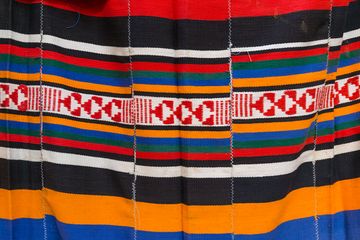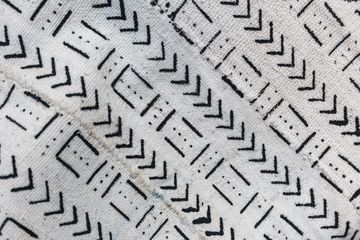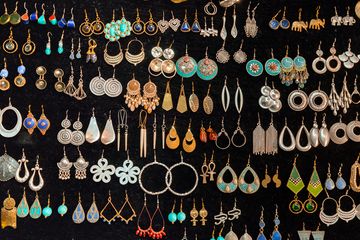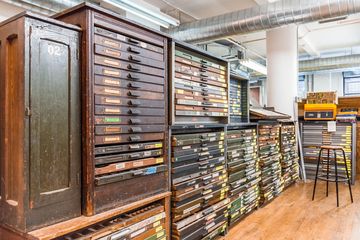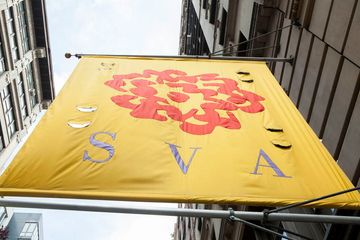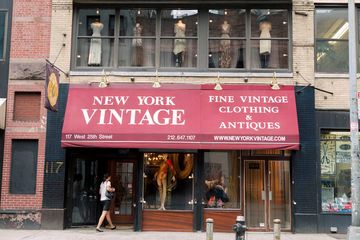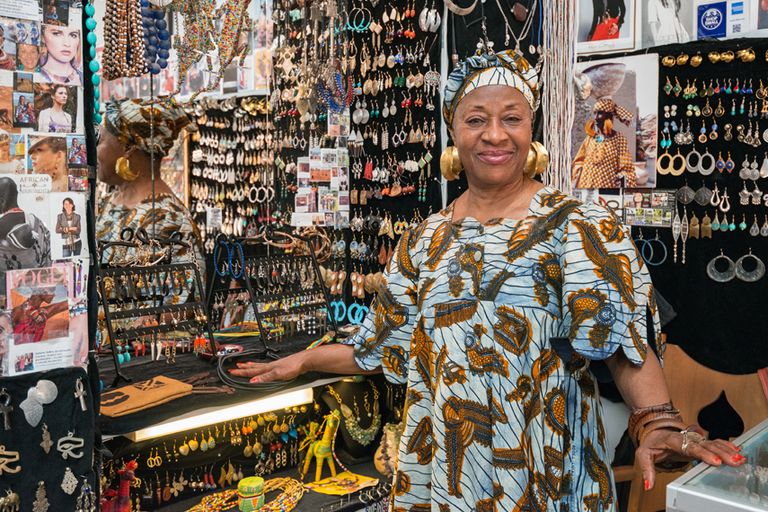
“It’s about being raised in Africa,” says Nnennaya Onyejuruwa, the owner of Ashione Gallery, referring to the meaning and purpose behind her shop. Any visitor to Ashione, tucked at the back of Flea Market Antiques and Collectibles, is guaranteed a warm welcome from Nnennaya and possibly one of her grown daughters, Ugonma and Ivuoma. Nnennaya told me that in Nigeria, where she is from, and in many other parts of Africa, “it really took a village to raise you." Because of that, Nnennaya finds herself constantly thinking about the close-knit community of her homeland. When her daughters were born, she wanted to make sure that they had the same sense of second home and extended family network, a desire and drive that eventually formed the foundations of Ashione Gallery.
In 1972, Nnennaya moved to New York with her then-husband. She studied at Columbia University and City College and then worked as an early childhood specialist for twenty-one years. Nnennaya chose to work with young children in the community rather than the education system, since that is where she believed she was most needed. Even though her own children would go through the American school system and grow up as New Yorkers, Nnennaya made sure that they did not forget their roots. She always emphasized the proper pronunciation of their names, explaining, “Everyone else will fudge on your name, so you must not.”
Nnennaya is probably best known for what she accomplished in her last six years as a childcare worker, which she spent in the court system. She related to me how she saw an ad in the newspaper by Victim Services Agency for a specialist to work with children. These young ones, who were from families going through the legal process, often suffered from abuse or the debilitating effects of growing up in a highly stressful family environment. Whereas most of her colleagues would not consider the job, citing the fact that children need stability and repetition (something that does not exist in the court system), Nnennaya, in her own words, said “Give them to me.” She ran the center from 1983-1989, marshaling court resources and the community at large. She even instituted a food pantry for families at risk of losing their children due to lack of food in the house while waiting for welfare to kick in. Nnennaya ran her program with help from community volunteers,including many retired specialists or students, who worked with the children. The programs were so successful that the Roxbury District Court in Boston asked for her assistance in opening a similar service. The judges were very appreciative of the programs, and Nnennaya was nominated by a Bronx Family Court judge to receive the 1989 Professional Special Citation, a country-wide award given annually by the National Labor Committee in honor Lewis Hine. Nnennaya proudly claims as a legacy the fact that she was able to institute the first three Court based Children Centers in the Boroughs of New York, services still being enjoyed by distressed families to this day. Many newly built court houses now also contain Children's Centers.
Understandably, Nnennaya felt “burnt out” after twenty-one years and turned her attention to her own children. One of her main difficulties in raising her daughters was “finding art that spoke of them.” The story that was told in all the museums that she took them to was very Euro-centric, so she began finding and collecting her own art, often taking trips back to Africa. The art proved to be popular among many people besides her children, including friends from the United Nations who visited her home. Ultimately, she was encouraged to open Ashione Gallery. “It came out of a need to stabilize my children,” she added, smiling. For many years, the gallery resided in the West Village (first on Perry Street and then on West 4th Street), but in its seventeenth year, 2008, the economy failed. Nnennaya decided to close and reopen in a place where she could share space. She moved to a corner of the indoor flea market on 25th Street and has slowly expanded, taking over the whole back room.
“We wanted a store of African Life,” Nnennaya stated, explaining that the gallery not only features African art and jewelry, but also invokes a sense of the African spirit. Nnennaya and her daughters greet everyone with the warmth of an African village – “We make people feel proud of whoever they are.” The women also occasionally hold events where they serve African food. “You become immersed in African culture in our shop,” Nnennaya told me. The unique nature of the space has earned the gallery some very positive attention, including an exposure of their objects in the New York Times and a feature in one of the episodes of Sex and the City. “We are the “It” store for African works of art,” Nnennaya proudly announced.
Though pleased by the attention of television and the media, Nnennaya appears to be equally moved by the special experiences that ordinary shoppers have in her store. She told me that one woman, who was a nurse in Miami, discovered Ashione Gallery while visiting New York. Three years later, the woman returned, waving the gallery’s business card. She had held onto it all that time, eager to come back one day. Another woman bought a pair of earrings at Ashione when the store was still in the Village. When she visited again a few years later, she was crestfallen that the store was no longer there. Luckily, she found the new address and showed up in her earrings, filled to the brim with stories to tell Nnennaya about all the compliments she had received whenever she wore them. These were only two of a myriad of stories in which people have formed a true connection with Ashione Gallery.
There is no doubt in my mind, however, that the real reason that people go out of their way to reconnect with the gallery is the nature of its owner. Nnennaya is a fascinating, bright woman who exudes warmth and friendship. No one can possibly leave Ashione without lifted spirits and the strong desire to want to visit again.
